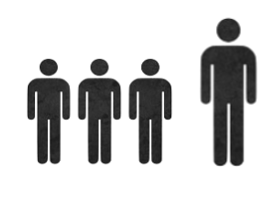English version of Travailler avec les Français: témoignages de 17 étrangers venant de 12 pays
An immersion in valuable feedback
Showing humility, changing perspectives, taking the time to listen to others, learning from their experiences, identifying their references and perceptions, taking a step back from oneself and one’s own practices, identifying blocking factors and key levers in intercultural relations, grasping and integrating the complexity of interactions and thus of the world, these are some of the essential benefits of the collection of testimonies offered here.
These were also the objectives of the group work carried out by students of the Executive MBA programs in Risk Management and Global Security Management (MARS) and Cybersecurity Management and Information Systems Governance (MACYB) at the School of Economic Warfare (EGE) in France, where I have been teaching intercultural risk management for nearly fifteen years.
Each group of students was asked to conduct interviews with professionals who had experience working with the French, to transcribe the interviews, and then to produce a synthesis indicating the recurring themes, the specifics, and then the practical advice that can be drawn from them for intercultural relations between the French and foreigners. Among the criteria, the interviewees had to come from three different countries, including one non-European country, and at least one woman had to be interviewed.
The interviews are rich and fascinating to read. I would like to thank the students for their commitment and enthusiasm in carrying out this unusual work in a difficult context (in particular because of the war in Ukraine: the availability of many contacts working in sensitive sectors is problematic).
I have selected extracts from these interviews among several reports. I have taken the most concrete and recurring topics on the professional relationship with the French. The notes in italics that introduce each section are my own. The first names have been changed and any information that would allow the identification of the organization of the interviewee has been removed.
Finally, when reading these testimonials, we must bear in mind that they contain an obviously subjective part and that they mostly cross three dimensions: personality, professional culture and the influence of the culture of origin. There is a “mirror effect” here: we learn as much about the French as we do about the interviewee, resulting in contrasting and sometimes contradictory experiences. For example, the hierarchical distance in France seems very great to an Israeli woman used to flattering professional relationships, but it seems more moderate to a Moroccan woman or a French-Senegalese man used to more top-down relationships in Morocco and Senegal.
For ease of reading, the excerpts are divided into nine sections:
- Hierarchical distance
- Meetings
- Communication
- Relationship to work
- Relationship to rules
- Relationship to risk and uncertainty
- The place of informality, work/life balance
- The French and diversity
- Qualities and positive influence of the French
* * *
1. Hierarchical distance
 France, the country of “Liberty, Equality, Fraternity” (its motto), is also a country of personal status and vertical structures. In his book L’Étrangeté française (in French) published in 2006, Philippe d’Iribarne describes this complexity well when he explains that the French “live in a permanent contradiction“, caught “in a kind of contradictory symbiosis between the desire for greatness and the ideal of equality”. According to the references of the interviewees, it is one or the other of these extremes that surprises them in their relationship to the French context.
France, the country of “Liberty, Equality, Fraternity” (its motto), is also a country of personal status and vertical structures. In his book L’Étrangeté française (in French) published in 2006, Philippe d’Iribarne describes this complexity well when he explains that the French “live in a permanent contradiction“, caught “in a kind of contradictory symbiosis between the desire for greatness and the ideal of equality”. According to the references of the interviewees, it is one or the other of these extremes that surprises them in their relationship to the French context.
Ilana (Israeli): The way the company works is more hierarchical and less free compared to Israeli companies. In Israel, a twenty-year-old can challenge the head of the company. I find that unthinkable in France.
Sara (Moroccan): In terms of organization and communication, it’s the same as in Morocco for meetings. But it’s different when it comes to relationships. In Morocco, people are afraid of their superiors and do not dare to tell them everything. For example, you can’t disagree with them, or you have to disagree respectfully.
Dewi (Indonesian, living in UK): In Singapore, people will be more hierarchical or show more superiority even if they are not the manager, for example because they are in a mentoring context or they are experts.
Babacar (French-Senegalese): The French are well educated and know how to express themselves in front of the hierarchy, which is sometimes different in Senegal, where submission to the boss plays a greater role. In Senegal, authority is accepted as a matter of course; in France, it is consultation and consensus that allow the group to move forward, at least in the tertiary world where I made my career.
Salma (Tunisian, has lived in the UK for 20 years): The British can make you progress even if you have a fairly low academic level. You can start from scratch to reach top management. I have an example of an Englishwoman who did not even have a high school diploma and reached top management after ten years. She is well educated, well spoken, she knows the social codes. Even if she makes a miscalculation, it doesn’t matter, we pass it on. She was trained for a year by some of the managers to climb the ladder. I think a French person would not accept that someone without a diploma could reach this level. The value of diplomas is very important to the French.
Kelly (American): Hierarchy is more important in France than in the US. In France, a junior or senior auditor will very rarely present an issue or conclusions to a partner, but a manager will take over. This hierarchical distance can create a sense of lack of consideration from management.
Alexandre (Lebanese): I didn’t expect an HR perspective on the world of work, where employees are not trusted. I had to learn how the French hierarchy works: it seems to me that “no” is not appreciated. I find that many companies expect their employees to do what they are told in a stupid and unpleasant way. I don’t think that’s productive.
Salma (Tunisian, living in the UK for 20 years): When the [French] boss arrives, he doesn’t say hello to us, but when he enters a room where there are other bosses, he greets everyone, asks how they are… The hierarchical relationship in England is different, it is much less marked than in France in the way social interactions are managed, not in terms of salary.
Babacar (French-Senegalese): In France, you have to look people straight in the eye, but in Senegal it’s not perceived well. Here it’s the opposite, you have to look at your shoes when you talk to an elder!
2. Meetings
 Whatever the references and habits of the people interviewed, there is unanimity on the French-style meetings: poorly prepared, too long, talkative, not very disciplined, not pragmatic enough, they are a real obstacle in the professional relationship. As a result, the French and foreigners have a different time frames for making decisions and taking action.
Whatever the references and habits of the people interviewed, there is unanimity on the French-style meetings: poorly prepared, too long, talkative, not very disciplined, not pragmatic enough, they are a real obstacle in the professional relationship. As a result, the French and foreigners have a different time frames for making decisions and taking action.
Ana (Romanian): In France there are a lot of meetings with sometimes unclear goals. They talk a lot before they act and everyone gives a little of their opinion. They take a lot of time to prepare before they act.
Derek (British): The meetings are less structured than in the UK and the language barrier is annoying, the French are not at ease or at the level to express themselves in English and the French language is too complex for a Brit to master.
Silvia (Romanian): What I noticed most during the meetings is that they could start debates that often prevent decision making.
Alexandre (Lebanese): The French are very action-oriented, but not result-oriented. How many times have I been in meetings to validate a 40,000 euro deal and there were 35 people in the meeting!
Daniel (Swiss): The meetings are poorly prepared, chaotic, while the security culture [Daniel’s area] is more military.
Babacar (French-Senegalese): We spend a lot of time in meetings discussing everything and nothing. Sometimes to agree on a comma!
Kelly (American): In France, the meetings are always late. In the U.S., we have meetings all the time. In France, the frequency is not so important, but the topics are not sufficiently prepared in advance. You often have to reschedule a meeting to make a decision, and some information is shared with the client very late (such as conclusions).
Christine (Belgium): I notice a lack of punctuality in starting meetings or in respecting the time allotted for discussions.
3. Communication
 The French often perceive themselves as quite direct in their communication, straightforward, not beating around the bush. They praise freedom of expression and claim to have a grumpy side, saying what they think. Of course, but… you also have to know how to put it into words, to find the right way to say it, to be able to adapt your level of language to the person, the status, the context, both orally and in writing. And so, without realizing it, they mix the direct and the indirect, the explicit and the implicit, the frank and the allusive. A real headache for many foreigners!
The French often perceive themselves as quite direct in their communication, straightforward, not beating around the bush. They praise freedom of expression and claim to have a grumpy side, saying what they think. Of course, but… you also have to know how to put it into words, to find the right way to say it, to be able to adapt your level of language to the person, the status, the context, both orally and in writing. And so, without realizing it, they mix the direct and the indirect, the explicit and the implicit, the frank and the allusive. A real headache for many foreigners!
Their tendency to prefer the theoretical approach also has two sides: on the one hand, the French know how to be pedagogical and persuasive; on the other hand, their love of debate can lead them to drift into endless discussions or topics that have no connection to the agenda. From their point of view, this is a sign of commitment. For many foreigners, on a practical level, it is a sign of confusion, even disengagement.
Salma (Tunisian, living in the UK): I was surprised by the poor level of English. Our boss doesn’t speak English very well, no one understands what he says in meetings. But he doesn’t care, it doesn’t block him, it doesn’t take away his confidence.
Christine (Belgian): I notice that the French have difficulty expressing themselves in a language other than their own. This is probably due to embarrassment or lack of training. Nevertheless, my French counterparts know how to express themselves convincingly and get their point across.
Julia (Spanish): The French are less direct. In Spain, I think people say things more clearly. I think the French pay more attention to appearances and hierarchy. The use of language, the way issues and arguments are presented are more elaborate in France. Sometimes, even if the content is the same, they pay more attention to the form than in Spain.
Ilana (Israeli): The French are less direct. For example, they don’t say “it’s not possible,” they say “it’s going to be complicated. I used to think it meant “it will be complicated, but we’ll try”, whereas now I know it means “no, it’s not worth trying”.
Ana (Romanian): The French are more talkative, complain more at work, are less disciplined than the Romanians. They talk a lot, but their speeches are well constructed and they try to convince others. They are convinced that they are right.
Kelly (American): In France, communication is sometimes a bit lacking in openness, especially when it comes to delivering bad news. Americans tend to be more direct and don’t beat around the bush.
Ilana (Israeli): The French are much less likely to interrupt than the Israelis, and they also expect to be listened to until the end when it’s their turn to speak. The French raise their voices less often than the Israelis in meetings, and displeasure is conveyed through more polite and less explicit language. On the other hand, if a Frenchman raises his voice, it will have much more impact than if an Israeli does. For us, raising our voice is just a way of communicating, whereas the French will see it as a lack of respect or education.
4. Relationship to work
 The previous sections add up to clarify our relationship to work. There is a link between presenteeism and hierarchical distance, as well as between poorly organized meetings and a weak results culture. Kelly, reacting to her American references, perceives with great sensitivity this lack of French pragmatism (another significant mirror effect: the Moroccan woman perceives a more efficient organization and better time management in France than in Morocco). But she adds an essential dimension: the need for a manager to give meaning to the action, to explain the “why” before going into the “how”, to take the time to convince and argue in order to involve his or her team.
The previous sections add up to clarify our relationship to work. There is a link between presenteeism and hierarchical distance, as well as between poorly organized meetings and a weak results culture. Kelly, reacting to her American references, perceives with great sensitivity this lack of French pragmatism (another significant mirror effect: the Moroccan woman perceives a more efficient organization and better time management in France than in Morocco). But she adds an essential dimension: the need for a manager to give meaning to the action, to explain the “why” before going into the “how”, to take the time to convince and argue in order to involve his or her team.
Since the focus of professional engagement is on the why rather than the how, this may partly explain why we give little feedback on this last dimension, other than to point out what is wrong.
Kelly (American): The French take the time to explain the guidelines, but not enough about the expectations or the purpose of the work to be done.
Daniel (Swiss): The presenteeism is important in France. The French don’t like to leave the office before the boss, it could be frowned upon. In Switzerland, we arrive earlier and leave earlier, and the organization is more structured.
Kelly (American): I really felt that you had to convince the teams to work, to make an effort, so that everyone was motivated. In France, the people doing the work have to see the meaning of what they are doing and why they are going to work for hours.
Sara (Moroccan): The French are more organized about time management than we are, and they respect schedules more.
Kelly (American): In the U.S., if a job requires extra effort, junior or senior auditors will do it without question or know who they are doing it for. In France, teams tend to work harder if they get along with their managers. I even heard one of my team members say to me, “Since you’re the one asking me, I’m willing to leave work later and do some audits that weren’t originally scheduled”. That’s because I had a good relationship with my teams. The extra effort is seen as a sign of respect for the hierarchy.
Julia (Spanish): I find them quite self-centered … As for appreciating the work of others: no, they are not capable of that. I didn’t get compliments or even simple thanks. They didn’t ask me if I worked like this in Spain. I had to be like them.
Kelly (American): I didn’t get enough feedback from my teams. I don’t find that clients give enough feedback either, compared to the US. Feedback in France is more political than in the US and less constructive. There are far fewer suggestions for improvement in French feedback than in American feedback. Training and coaching of employees is not at the same level as in the US.
5. Relationship to rules

This is a subject of great confusion for many foreigners! On the one hand, they see a massive presence of rules, regulations and other procedures that must be officially and formally followed; on the other hand, their French counterparts can apply them contextually and not strictly, or even disregard them at certain times and in certain situations.
There is a great deal of implicitness in the French relationship to rules, both in society and in business. But how can we decode it? How can we maintain confidence in those French people who sometimes do not respect the rules they impose on others? This is a major topic of misunderstanding that is rarely addressed in intercultural training because it touches on taboos within the organization.
To better understand the cultural reasons for our relationship with rules and to make the link with safety issues, I invite you to read the wonderful work done by a group of students from the École des Ponts: Do the French have a contextual relationship to rules? Exploration based on the case of the Eckwersheim accident (in French).
Ana (Romanian): The French tend to discuss or adjust commands.
Kelly (American): In France, procedures and best practices are adapted according to whim. For example, it is forbidden to drink coffee in the open or at the desk. So teams will spend 30 minutes in the cafeteria instead of 5 minutes for coffee. The French tend to follow certain rules excessively when it suits them. On the contrary, sometimes you are asked to do the opposite of what is in the procedure and you have to apply it without question!
Paul (British): The French are very sticklers for following rules and standards. They often hide behind these arguments to avoid doing certain things. My counterparts are conscientious and respectful of deadlines, but also of their office hours, if you know what I mean. The French can also be undisciplined and critical of their bosses.
Kelly (American): In the U.S., meeting deadlines is an important issue that should not be overlooked. In France, there is often a tendency to postpone a deadline. In my opinion, this has to do with a lack of discipline, because we know that the team waiting for our audit results has given us a date well before the “real” date. When this situation is known, we know that the team has several days more than the communicated deadline.
6. Relationship to risk and uncertainty

Although the following statements are limited in number and diversity (British and American points of view), they should be read in continuity with those in the previous sections to shed light on our relationship with risk and uncertainty.
Many foreigners feel that their French partners have a need for security, which slows down decision making and action. This can lead to a very demanding upstream exploration and an accumulation of information before the decision is taken. In the background of this phenomenon, the fear of making mistakes (not mentioned below) may also be at work to explain this delay in taking action compared to other partners.
Salma (Tunisian, has lived in the UK for 20 years): I also understand that the French don’t like risk. So they send us the business here [in the UK] so that we take the risks!
John (British, living in Dubai): The French people I worked with were very good at handling stress, but they lacked the decision-making skills that the British have.
Salma (Tunisian, has lived in the UK for 20 years): The French are good theorists, they make specifications for five years and the action has not yet started. On the other hand, the English take the risk, the French do not.
Kelly (American): There is a real lack of foresight in France. Supervisors wait to know who is going to be involved in the mission, to have the best auditors and the best organization before they make a decision and book the schedules. This leads to emergency situations and arbitration because everyone is making decisions very late.
7. The place of informality, work/life balance

The combination of formal and informal relationships at work, on the one hand, and the separation of work and private life, on the other, creates a confusing ambiguity for many foreigners. Those who prioritize task and action appreciate the French formality but are uncomfortable with the intrusion of non-professional topics and relationships during the workday; those who are sensitive to interpersonal relationships appreciate the warmth of the relationship but find it difficult to understand why this relationship ceases outside of work hours.
Ilana (Israeli): With the French, everything is very formalized compared to what I knew. But at the same time, there is still a lot of freedom and flexibility. Especially when you get to know the person you’re working with. I think the French want to appear formal, but fortunately for me they are quite flexible and open.
Kelly (American): In France, employees are much more concerned about work-life balance and spend more time on personal activities. In the U.S., we are surprised to learn that teams in France go on vacation while an audit is still open and we are still in high season.
Ilana (Israel): What surprises me the most is the annual vacation and that the time between noon and two in the afternoon is sacred. It’s not like that in Israeli culture.
Silvia (Romanian): We can’t plan meetings between 12:00 and 2:00, and it can be complicated to find a time slot that works for everyone.
Kelly (American): In France, working hours are well protected, teams respect the 8-hour day. In the U.S., the priority is on results, which can lead to long hours at the expense of personal life. In France, some very urgent matters can be postponed. Teams find a solution to protect themselves, for example by proposing partial conclusions.
Paula (Spanish): The French are more distant, they observe more time before making a connection.
Adamou (Nigerien): The French are impatient, too hasty, too respectful of schedules, too respectful of regulations, obsessed with details, the computer tool (e-mail) and administrative bureaucracy. Interpersonal relations with them are less important than with the people of Niger, because “the whites have a watch, but never the time”!
Dewi (Indonesian, living in UK): I noticed something: the French almost never turn on their camera during a team meeting. I don’t know if that says anything about the French work culture, but I noticed it.
Sara (Moroccan): I saw some strange behaviors, for example, my colleagues would talk badly about absent colleagues during breaks, I would stay neutral on my side and not say anything, and it affected my daily relationship with the group. For them, it was strange that I didn’t criticize my colleagues.
8. The French and diversity
 The comments on this subject are not flattering. While most companies have become more international and their environment has become both richer and more uncertain, requiring teams capable of crossing different perspectives to deal with this complexity, there are real obstacles to valuing the diversity of backgrounds, experiences and origins. If the French are not very effective in practicing interculturality at the national level, they will also be ineffective at the international level. For some explanations, I invite you to read L’illusion aculturelle (in French).
The comments on this subject are not flattering. While most companies have become more international and their environment has become both richer and more uncertain, requiring teams capable of crossing different perspectives to deal with this complexity, there are real obstacles to valuing the diversity of backgrounds, experiences and origins. If the French are not very effective in practicing interculturality at the national level, they will also be ineffective at the international level. For some explanations, I invite you to read L’illusion aculturelle (in French).
Daniel (Swiss): There is a lack of listening to people who have a different experience than the majority. I was asked to come to a French company, but in the end they didn’t value my point of view, which should bring something more. Bosses rely a lot on their experience, their past and therefore on their own references. The French don’t value enough the points of view of those who don’t come from the same background as they do. In a way, the French underestimate the qualities of others in such cases, which is ironic because that’s what I was hired to do.
Kelly (American): There is a real hierarchy between schools and universities. It is very surprising that some good profiles are not even contacted because they do not come from a school targeted by the company. In the U.S., a company will evaluate the level of a candidate by looking at his or her GPA [Grade Point Average] and the type of study, but not just the school.
Ilana (Israeli): I am also very surprised by the fact that when the French hire someone, even with twenty years of experience, they first ask about his or her academic background.
Salma (Tunisian, 20 years in the UK): The British know how the French treat minorities. For example, one of my colleagues was on vacation in Paris. He was in a café and there was a group of black people next to him. Some policemen came and were very abrupt with them, although they had done nothing wrong. My colleague asked one of the policemen why they were behaving like that. He replied that it was none of his business. In fact, the French like the world to adapt to their world. That doesn’t mean the British like foreigners. But they have a strong sense of politeness and diplomacy.
Adamou (Nigerien): The French [in Africa] still have a philosophy of colonization in their strategy and behavior.
Salma (Tunisian, living in the UK for 20 years): Because I work in an international company, they have a guide called “Ethnicity, Inclusion, Diversity” that explains how to behave with dignity with others who do not necessarily share the same cultural codes. They are trying to apply it here. But I still have the impression that the French vision on these issues remains in the mind.
9. Qualities and positive influence of the French
 The following remarks are consistent with those I have collected during more than twelve years of intercultural training. Seriousness, competence, general culture and conviviality are generally praised by foreigners who work with the French. Many of them envy your ability to balance work and private life. Many wonder about the secret of our performance when they spend more time at work or plan better than their French counterparts. Some even end up “Frenchifying” themselves, changing their own references to incorporate the best of their practices or values.
The following remarks are consistent with those I have collected during more than twelve years of intercultural training. Seriousness, competence, general culture and conviviality are generally praised by foreigners who work with the French. Many of them envy your ability to balance work and private life. Many wonder about the secret of our performance when they spend more time at work or plan better than their French counterparts. Some even end up “Frenchifying” themselves, changing their own references to incorporate the best of their practices or values.
John (British, living in Dubai): The socialization was really what I enjoyed the most with my French colleagues. I enjoyed spending time with them, they showed a positive side of their personality, different from the one they had in the office.
Alexandre (Lebanese): One quality that stood out for me? I would say seriousness. In my team, most of the people I worked with were graduates of top engineering schools. So they were always very technically rigorous. Competence too. Most of the people I work with are highly competent. That is not necessarily the case elsewhere, even in the most serious companies. The French also have a strong sense of duty and value fairness in teams.
Julia (Spanish): I like the attention they pay to form. I admire the polite formulas they use, even if they are just formulas.
Ana (Romanian): I’ve become a fan of the preparatory meetings and the bonding moments!
Daniel (Swiss): I noticed an exceptional general culture and I appreciate the art of living and working together, including moments of conviviality.
Paul (British): We criticize a lot the work done, but we are impressed by the results, while the French seem to work less than us and without any real clearly defined method. This amazes and overwhelms us and sometimes makes us a little jealous and of course even more critical!
Kelly (American): I try to protect my personal life more by putting up barriers. I force myself to say “stop” when I can’t go out for the evening because I have plans (sports, going out…), whereas before my stay in Paris I would have canceled my plans. I have learned to postpone certain things until the next day if my priorities allow it. My family tells me that I sigh a lot more since I came back from France! Pfff…
* * *
To go further, you can read:
- Working with the French: 22 foreigners from 19 countries share their experiences
- Working with the French: Indians share their experiences
- Cross-cultural turbulence at Air France KLM: employees share their experiences
- Working with the French: feedback from the field
Quelques suggestions de lecture:
- Working with the French – feedback from the field
- Working with the French: Indians share their experiences
- Working with the French: 22 foreigners from 19 countries share their experiences
- In the Land of Equality – A Frenchwoman Shares Her Finnish Experience
- Cross-cultural Turbulence at Air France-KLM: employees share their experiences
- Intercultural meetings: 10 good practices to reduce misunderstandings



Hello,
It’s funny how some people project the behavior of their culture onto French culture.
It’s very hard to talk about another culture without going through the bias of ours.
But, do we really know her?
Best regards
Christian
@Christian – Yes indeed! “Mirror effect”… I see myself in you 😉